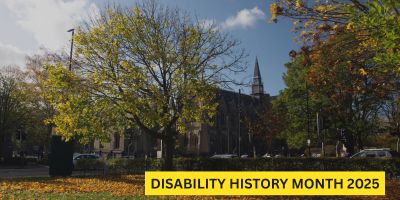School of Sociology spearheads gender research

Today, on International Women’s Day, we celebrate the long history of feminist research within the School of Sociology and Social Policy.
Twenty-five years since the adoption of the Beijing Declaration and Platform for Action, progress towards equal power and equal rights for women remains elusive. No country has achieved gender equality, and the COVID-19 crisis threatens to erode the limited gains that have been made.
Since its first gathering in 1911, International Women’s Day on Friday 8 March has become a focal point to celebrate the social, economic, cultural and political achievement of women. It also marks a call to action for accelerating women’s equality, an issue that has been central to ongoing research and study within the School of Sociology and Social Policy.
Playing a significant role in driving research around gender and women’s studies, the Centre for Interdisciplinary Gender Studies brings together over 170 academic staff from across the arts and humanities, social sciences, medicine and healthcare studies.
Meet some of the academic staff and postgraduate researchers in the School of Sociology and Social Policy who are delivering groundbreaking research in this area.
Rethinking gendered inequalities
Associate Professor in Social Inequalities Kim Allen’s current work – funded by the Economic and Social Research Council – looks at gendered inequalities in young women’s earliest experiences of work (including work while studying) and how these might shape later outcomes in the labour market.
Although young women now outperform men in education, and outnumber them in higher education, by the time they hit their 30s, working women still encounter inequalities in the labour market, including a growing gender pay gap and occupational segregation.
Moreover, many of the gains made in women's employment over the last 50 years have been stalled and even reversed by recent economic disruption, including austerity, the pandemic and cost of living crisis.
Dr Allen’s research, in collaboration with the Young Women’s Trust, aims to impact academic disciplines across the Social Sciences and produce benefits for policymakers, industry, education and third sector organisations working to challenge inequalities and promote positive change in the lives of young women.
Sex change in twentieth-century Argentina
Director of the Centre for Interdisciplinary Gender Studies, Dr Patricio Simonetto’s research engages with questions about how sexuality intersects with health, science, and social movements in Latin America. He explores questions around how sexuality reshaped notions of whiteness in Latin America, how the medical portrayal of LGTBQ+ and sex workers' bodies shaped notions of sex and sexuality, how LGTBQ+ movements produce social theory, and how queer and trans people create scientific knowledge and technologies.
His most recent monograph, A Body of One's Own. A Trans History of Argentina (University of Texas Press, 2024) examines how trans bodies were understood, policed, and shaped in a country that banned medically assisted gender affirmation practices and punished trans lives.
Gender, technology and the body
Karen Throsby, Professor of Gender Studies and Head of the School of Sociology and Social Policy, emphasizes the importance of feminist scholars on her approach to leading the School:
I have been fortunate to be part of a community of feminist scholars from the outset of my academic career. Many of these are not only brilliant and inspiring scholars but have also modelled inclusive and compassionate ways of being and working in higher education.
Professor Throsby’s research focuses on the intersecting fields of gender, technology and the body, which she has explored across a range of sites including the new reproductive technologies, the surgical management of weight, and extreme endurance sport. Her most recent book, Sugar Rush: Science, Politics and the Social Life of Sugar, explores the unseen ways in which the contemporary attack on sugar compounds gender and other intersecting inequalities.
Disability and interpersonal violence
Data from the Crime Survey for England and Wales (CSEW, 2019) indicates that disabled people aged 16 to 59 are almost twice as likely to have experienced sexual assault in the past year than non-disabled people (3.7% vs 1.9%) and that sexual violence is a gender-based crime: 5.7 per cent of disabled women experienced sexual assault compared to 1.1 per cent of disabled men.
In 2022, Dr Andrea Hollomotz led a Ministry of Justice funded qualitative research project with disabled victim-survivors of sexual violence. This outlined disabling barriers to accessing support and solutions for overcoming these, including on the design of inclusive services. The findings and recommendations from this research can be accessed here. They informed recommissioning of the Rape and Sexual Abuse Support Fund to help ensure it meets the needs of all victim-survivors. The team is currently writing a further report on victim-survivor’s experiences of reporting sexual violence to the police.
Postgraduate Kharis Hutchison is currently conducting qualitative interviews with women with Multiple Sclerosis who have faced domestic violence and abuse. Her work is part of a broader programme of research, funded by the Horne Family Charitable Trust. Overall, the aim of this project is to increase the evidence base on Domestic Violence and Abuse experiences of and support accessed by people with Multiple Sclerosis. Dr Shruthi Venkatachalam will commence a 2-year post-doctoral fellowship in April 2024 as part of the same project. She will take the lead on the impact and engagement strategy of this project, as well as on developing a toolkit for healthcare practitioners.
Gender equality in the cost-of-living crisis
Dr Jessica Martin’s research explores the intersections of gender, race and class in times of crisis. In particular, she focuses on representations of women in popular culture under austerity and the cost-of-living crises which we know disproportionately impact women. Jessica’s book Feminisms, Austerity and Domesticity: The Rise of Celebrity Domestic Experts in Popular Culture will be released next year as part of the Bloomsbury Library of Gender and Popular Culture.
Jessica recently worked with Professor Ruth Holliday to write the catalogue essay for the “Contested Bodies” exhibition ‒ an exhibition of amazing art from around the world by women identified and gender-variant artists. Professor Holliday is best known for her work on the (cultural) sociology of the body, gender, material culture and consumptioin, particularly in the areas of Kitsch and Cosmetic Surgery. Her latest book Beautyscapes, published by Manchester University Press, explores the global phenomenon of international medical travel, focusing on patient-consumers seeking cosmetic surgery outside their home country and on those who enable them to access treatment abroad, including surgeons and facilitators.
Both have also been working on the re-design of the School of Sociology and Social Policy Gender Studies MA Programme, which includes Ruth’s module, Contested Bodies, and a new optional module on Gender, Sexuality and Popular Culture.
Associate Professor in Ethnicity and Racism Studies, Dr Yasmin Hussain works on Muslim women diasporic identities. She has carried out a Joseph Rountree Foundation-funded project entitled ‘The Role of Higher Education in providing Opportunities for Young South Asian Women’.
Postgraduate research on gender
Focusing on the experiences of women and non-binary people who sell sexual content on digital platforms, PhD candidate Georgina Trace conducts research looking at the material conditions of online sex work, but also considers the discourses people ascribe to their work.
Her research findings have also brought to light the ways in which these workers brand and present their bodies on platforms, and how this impacts their experiences of embodiment. A significant finding within the research is the productive possibility that digital platforms have for shaping new sexualities and forms of gender expression, particularly for gender non-conforming people who have found community support in kink and queer sex work spaces.
Researching the activism of young women in China, postgraduate researcher Taoyuan Luo is exploring the interrelationship of feminist theory, popular culture, mediated texts, youth, and identification. Her PhD topic is 'Identification or Alienation: A Study of Chinese Young Women’s Perceptions of Feminism.’ International postgraduate Ayu Kusumastuti works on the political participation on female domestic workers. Her thesis objectives are to map and measure political transnational of Indonesia migrant female workers; provide recommendations to related stakeholders; and generate an advocacy model for female migrant workers to increase their political literacy.
The variety of research above, in particular the work carried out by the Centre for Interdisciplinary Gender Studies and across the School of Sociology and Social Policy, demonstrates that University of Leeds is at the forefront of gender research, tackling some of the most pressing social issues of our modern lives.
Further information
For any media enquiries, please contact Sally Annett, the Faculty Communications Manager for Social Sciences, via s.annett@leeds.ac.uk.




